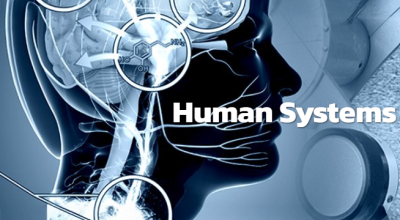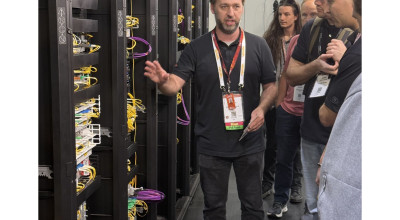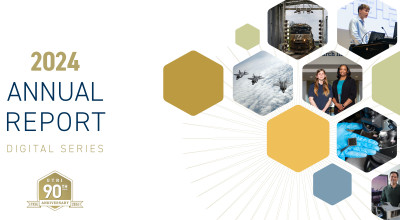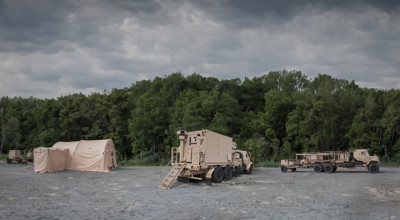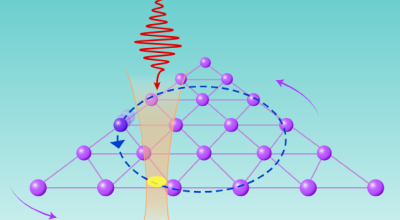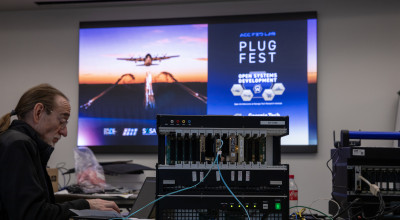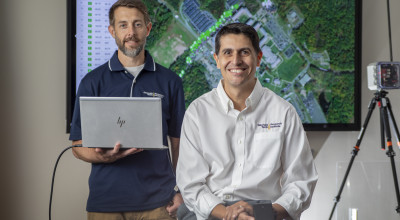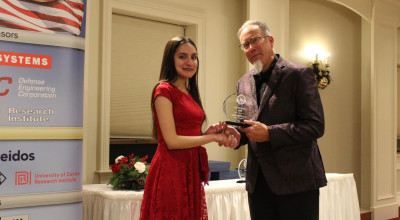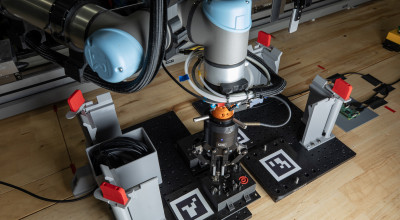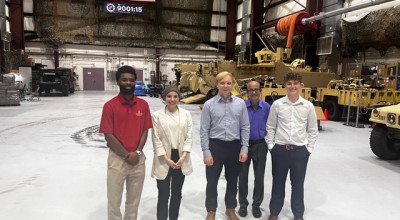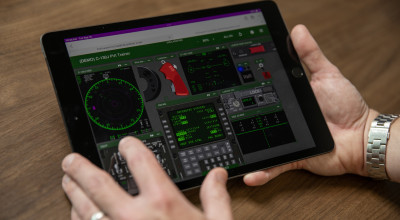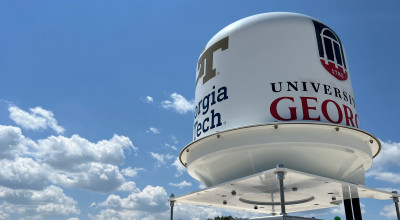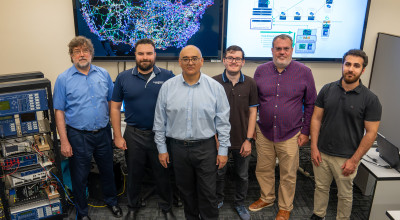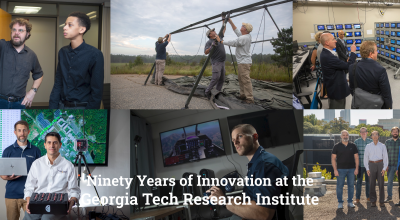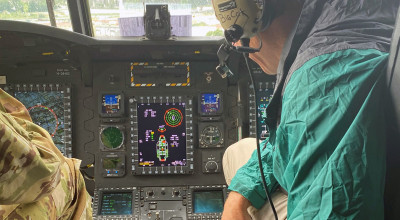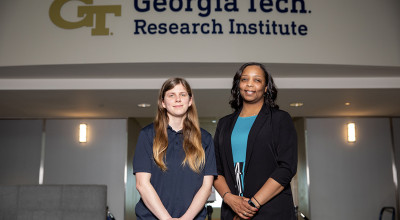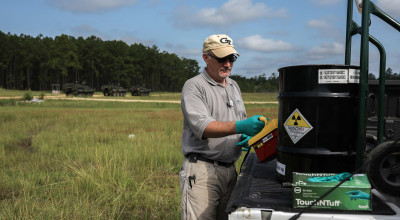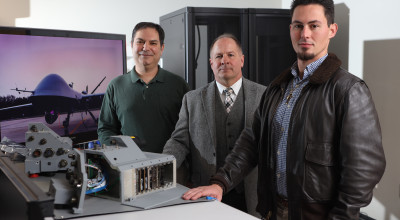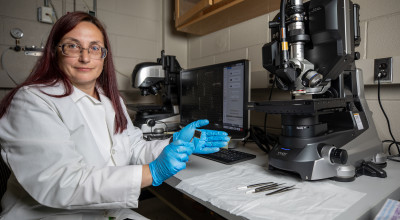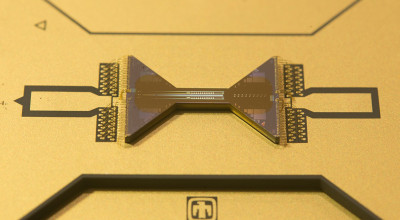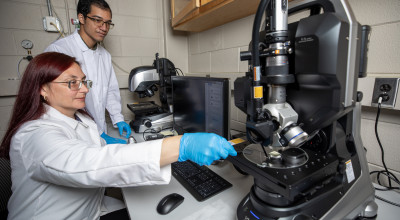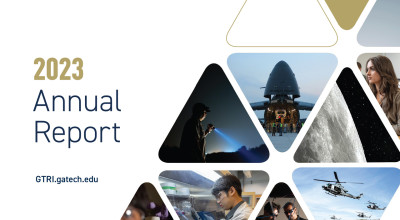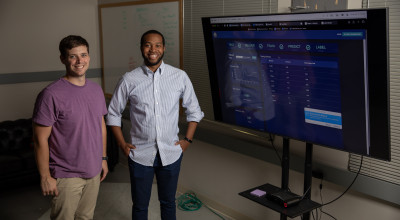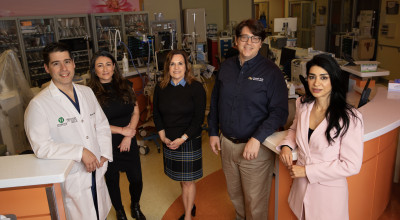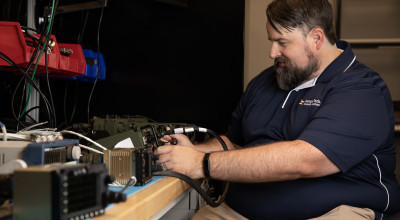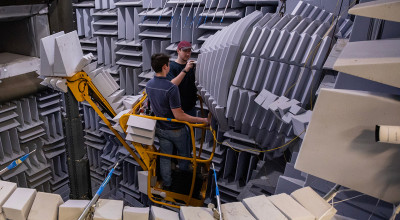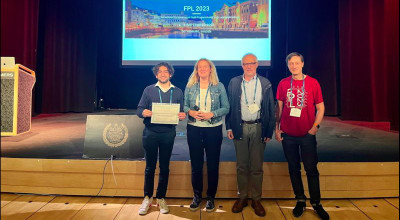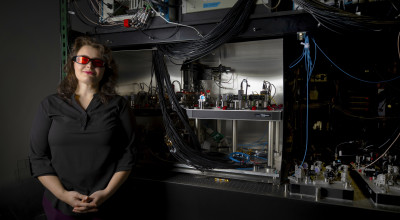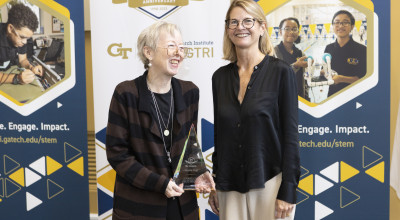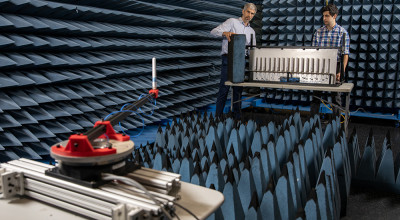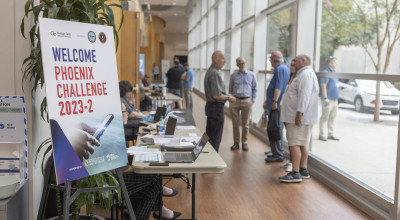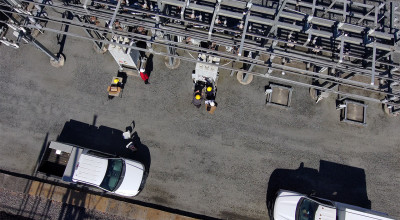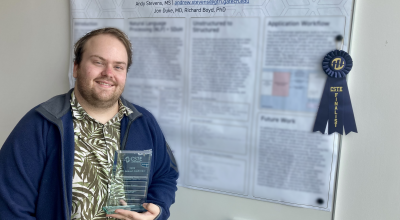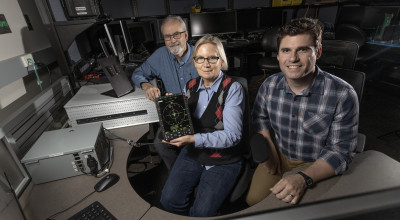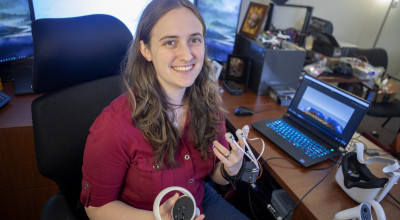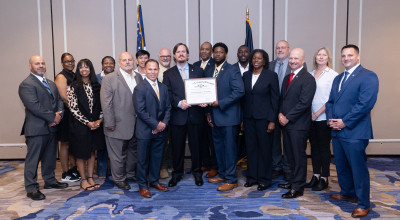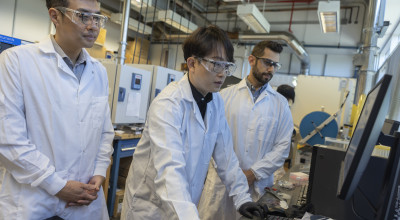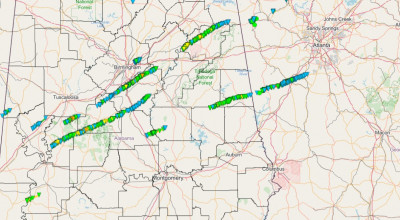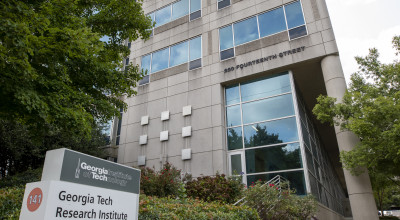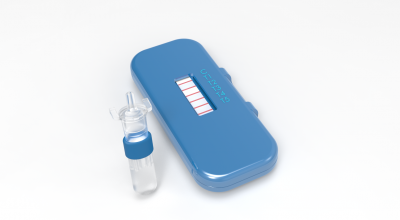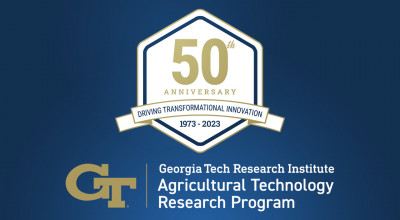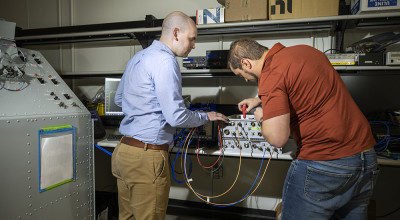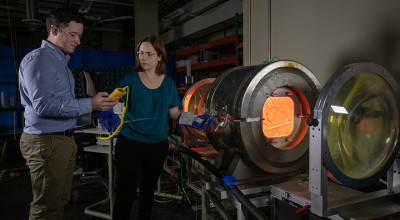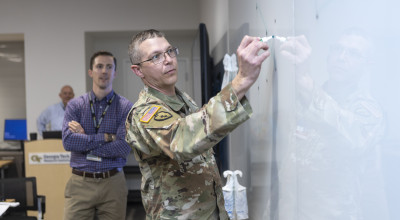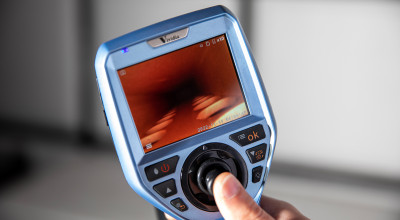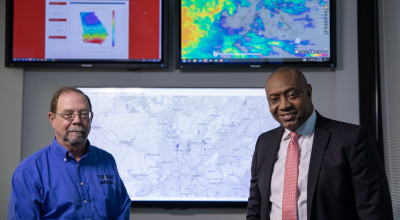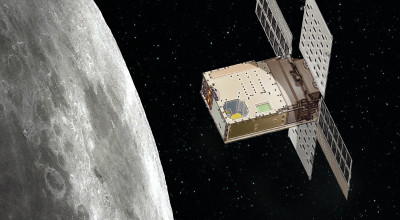GTRI News
The Georgia Tech Research Institute (GTRI) has appointed Mark Militello as its next Associate Vice President (AVP) of Finance and Research Administration/Chief Financial Officer (… Read More >>
At the 2025 Faculty and Staff Honors Luncheon, held recently at Georgia Tech’s Exhibition Hall, the Institute celebrated the achievements of its dedicated faculty and staff. Among… Read More >>
Jeremy Epstein, a cybersecurity researcher with more than 25 years of industry and government experience, has joined the Institute for Cybersecurity and Resilient Infrastructure… Read More >>
GTRI’s Comas Haynes, Ph.D., has been honored with Georgia Tech’s Executive Vice President for Research (EVPR) Institute Research Award for Outstanding Achievement in Research… Read More >>
Dr. Jud Ready, a Principal Research Engineer in the Electro-Optical Systems Laboratory (EOSL) at GTRI, was recently featured on Georgia Tech’s Generating Buzz podcast. Ready… Read More >>
In recent pilot tests conducted at the City of Woodstock's wastewater treatment plant in Georgia, GTRI demonstrated that its nanoparticle technology improves efficiency and… Read More >>
GTRI researchers from the Applied Systems Laboratory (ASL)’s Human Centered Engineering Division (HCED) recently attended the National Defense Industrial Association (NDIA) Human… Read More >>
Stephen Welby joined GTRI as the new Deputy Director of Research for the Sensors and Intelligent Systems Directorate (SISD) on April 1. He will work closely with industry and… Read More >>
Georgia Tech Research Institute (GTRI) actively engaged with key stakeholders and demonstrating its advanced research capabilities during the ongoing Association of the United… Read More >>
According to a recent National Defense Magazine article, the Pentagon is increasingly turning to the commercial sector to bolster its capabilities in this domain. David Zurn… Read More >>
In an innovative approach to sustainable infrastructure, Georgia Tech Research Institute Principal Research Engineer Jud Ready has spearheaded the installation of a… Read More >>
GTRI in Photos showcases our favorite pictures of GTRI research and operations in action. Read More >>
In the recently concluded SuperComputing 2024 conference, GTRI's David Ediger, Ph.D., voluntarily led a team to set up the critical network infrastructure, consisting of around… Read More >>
Principal Research Scientist Jill Gostin has been named a candidate for the 2026 Institute of Electrical and Electronics Engineers (IEEE) President-Elect, marking another… Read More >>
The digital edition of GTRI's 2024 Annual Report provides an overview of our accomplishments, research investments and outreach programs. Read More >>
GTRI is supporting the Integrated Battle Command System (IBCS), which is currently the Army’s top air and missile defense modernization effort. IBCS will ultimately replace older… Read More >>
By unlocking the ability to control and read the states of ions in a tiny spinning crystal, scientists have set the stage for a new way of performing analog quantum simulations… Read More >>
Ingenuity from a group of soldiers stationed at Fort Stewart – and help from engineers at the Georgia Tech Research Institute (GTRI) – has produced a possible solution for an… Read More >>
GTRI recently placed first and third in the "expert-level track of the 2024 Southeastern Cyber Cup contest, building on its strong performance the previous year. Read More >>
The Georgia Tech Research Institute (GTRI) is pleased to announce Padraic (Paddy) Heiliger as the new manager of the Huntsville Field Office. Read More >>
Representatives from nearly two dozen makers of open-architecture equipment for DoD sensing-related applications met in early December at GTRI to demonstrate that their equipment… Read More >>
GTRI has earned a top industry award for its co-development of a technology designed to prevent heat injuries in soldiers. Read More >>
GTRI congratulates Moeiini (Moi) Reilly, who recently received the 2024 Outstanding Alumni Award from Central Georgia Technical College (CGTC). The award recognizes Moi's… Read More >>
All three members of GTRI Research Security’s (RS) Insider Threat Program (ITP): ITP Senior Official Dannie Lyvers and ITP analysts Chikita Sanders and Roshaun Brown, have… Read More >>
Isabella Reyna, a data analyst in the Electronic Systems Laboratory’s (ELSYS) Test Engineering Division (TEN), has received the Young Professional Award from the Association of… Read More >>
On Dec.13, we celebrate the National Guard's Birthday. It's a day to honor the resilience and versatility of the Guard and its members who seamlessly juggle their military… Read More >>
Eric Grigorian, Chief of the Architecture & Systems Development Division in the Applied Systems Laboratory (ASL), is featured in the November 2024 issue of IEEE Spectrum, the… Read More >>
A knowledge-driven robotics (KDR) system now under development at the Georgia Tech Research Institute could be integrated with diagnostics and other systems to help maintain… Read More >>
GTRI has expanded its Defense-university Affiliated Research Traineeship (DART) Program to Tuskegee University, a historically Black institution in Alabama. The DART Program… Read More >>
A new training system that can run on ordinary tablet computers is enhancing existing electronic warfare (EW) instruction for the crews of U.S. air mobility aircraft, including… Read More >>
GTRI in Photos showcases our favorite pictures of GTRI research and operations in action. Read More >>
Collaboration among three Georgia institutions of higher education on the operation of a new weather radar system will enhance student learning, provide new opportunities for… Read More >>
GTRI is developing a physics-informed machine learning (ML) approach to predicting satellite spin rates, which could improve the accuracy of satellite spin predictions and… Read More >>
By developing a deep and comprehensive understanding of what constitutes “normal” operations inside electric power systems, Georgia Tech cybersecurity researchers hope to identify… Read More >>
Ninety years since its establishment, the Georgia Tech Research Institute (GTRI) has stayed true to its core mission: applying science and engineering to create practical… Read More >>
Implantable and wearable medical devices such as pacemakers, defibrillators, glucose monitors, nerve stimulators, and drug-infusion pumps are increasingly being used to improve… Read More >>
GTRI is leading the development of an integrated artificial intelligence response hub for Southwest Georgia to help communities streamline disaster management and logistics. Read More >>
The National Defense Industrial Association (NDIA) Human Systems Division recently announced the election of Stuart Michelson, Associate Division Chief in the Applied Systems… Read More >>
This spring, the Georgia Society of Professional Engineers (GSPE) presented awards at the 2024 Georgia Engineering Awards to esteemed individuals who have demonstrated excellence… Read More >>
A virtual training environment developed for aircrews of U.S. Army rotorcraft has been deployed to training ranges in the U.S. and Europe to help familiarize warfighters with the… Read More >>
GTRI's Tuition Assistance Program (TAP) covers tuition and fees for eligible employees who attend a University System of Georgia (USG) institution. Read about three employees who… Read More >>
GTRI is developing an environmental, social, and governance (ESG) scoring system for the U.S. commercial real estate market, similar to a credit score, that stakeholders could use… Read More >>
Four members of the Georgia Tech Research Institute’s (GTRI) faculty have been honored by the University System of Georgia's (USG) Board of Regents with 2024 Regents’ Researcher… Read More >>
The command will also be testing out a collaborative mission autonomy software called Golden Horde, he said. Developed by the Georgia Tech Research Institute, Golden Horde will be… Read More >>
Gregory Louden, Principal Research Engineer in the Georgia Tech Research Institute's Advanced Concepts Laboratory (ACL), and head of its Advanced Warfighting Technologies… Read More >>
At a recent media event, the Georgia Tech Research Institute (GTRI) and Norfolk Southern unveiled a new digital train inspection portal near Jackson, Georgia, marking the… Read More >>
While big data has garnered much attention in recent years, small datasets and artificial intelligence (AI) can provide valuable benefits on the battlefield, according to Margaret… Read More >>
In a recent interview, Haynes shared how he plans to leverage his expertise in hydrogen and industrial efficiency in his new role on the U.S. Department of Energy’s inaugural… Read More >>
More than 3 years after a federal report downplayed holes in a network that enables advanced warning of dangerous storms, dozens of regions remain vulnerable....The University of… Read More >>
GTRI Principal Research Engineer Jud Ready has been selected to join the National Academy of Inventors’ (NAI) 2024 Class of Senior Members, a group of 124 academic inventors… Read More >>
Modernization efforts utilizing the Modular Open Systems Approach (MOSA) and the Sensor Open Systems Architecture (SOSA™) standard have enabled the rapid development and… Read More >>
To spot defects on moving trains, Norfolk Southern Railway (Atlanta, GA, USA) is building train inspection portals on tracks in the United States. The Georgia Tech Research… Read More >>
To address concerns about artificial intelligence (AI) applications, researchers at the Georgia Tech Research Institute (GTRI), in collaboration with the National Security Agency’… Read More >>
GTRI in Photos showcases our favorite pictures of GTRI research and operations in action. Read More >>
A technical paper titled “Rapid exchange cooling with trapped ions” was published by researchers at Georgia Tech Research Institute.“The trapped-ion quantum charge-coupled device… Read More >>
A new National Science Foundation award to Georgia Tech will help researchers learn much more about mysterious cloud top discharges (CTDs), which reach as high as 70 kilometers (… Read More >>
ATLANTA — For Capt. Chris Aliperti, January’s “hackathon” — an annual innovation collaboration between the 3rd Infantry Division and Georgia Tech — felt like coming home.The young… Read More >>
A new cooling technique that utilizes a single species of trapped ion for both computing and cooling could simplify the use of quantum charge-coupled devices (QCCDs), potentially… Read More >>
A new cooling technique that utilizes a single species of trapped ion for both computing and cooling could simplify the use of quantum charge-coupled devices (QCCDs), potentially… Read More >>
Dr. Craig Arndt, Principal Research Engineer in ELSYS and Division Chief of the Human Centered Engineering Branch, was recently awarded the “Expert Systems Engineering… Read More >>
Long-term image sequences of materials exposed to space conditions could help the designers of future spacecraft know what to expect from a new generation of advanced materials. Read More >>
Salvus, LLC, a CJB Company, has entered into a licensing agreement with Georgia Tech Research Corporation (GTRC) to gain access to PFAS sensing technology for use in the… Read More >>
Collaboration between Norfolk Southern Corporation and the Georgia Tech Research Institute (GTRI) has led to the development of digital train inspection portals that use advanced… Read More >>
Collaboration between Norfolk Southern Corporation and the Georgia Tech Research Institute (GTRI) has led to the development of digital train inspection portals that use advanced… Read More >>
The Digital Edition of GTRI's 2023 Annual Report provides an overview of our accomplishments, research investments and outreach programs. Read More >>
The GTRI Research Internship Program (GRIP) is accepting student applications for the Summer 2024 session! Encourage any graduate and undergraduate students to apply! Read More >>
GTRI is developing a Machine Learning Operations (MLOps) platform that standardizes the development and testing of artificial intelligence (AI) and ML models to enhance the speed… Read More >>
GTRI marches into 2024 smartly with the Third Annual Marne Innovation Workshop, a collaborative event co-hosted with the 3rd Infantry Division (3ID) and the Georgia Tech Army ROTC… Read More >>
Researchers at the Georgia Tech Research Institute recently combined machine learning, field-programmable gate arrays (FPGAs), graphics processing units (GPUs), and a novel radio… Read More >>
A team of three GTRI researchers made it to the finals and came home with second place in the "Southeastern Cyber Cup" competition, a multi-day national-level higher education… Read More >>
GTRI and Georgia Tech are developing an application of quantum computing to solve proof-of-principle problems in computational fluid dynamics that could streamline efficiencies… Read More >>
GTRI, Children’s Healthcare of Atlanta and Emory University’s Nell Hodgson Woodruff School of Nursing have conducted a study using wearable sensors to better understand how… Read More >>
Early next year, the public will have access to a new tool that makes the cost of health care more transparent — it’s a statewide database of insurance claims.Georgia will join… Read More >>
The International Journal of Aeroacoustics has recently published a special issue dedicated to Dr. Krishan "Krish" Ahuja, marking 50 years of his groundbreaking research in the… Read More >>
GTRI researchers are developing the software necessary to integrate new control, radio, and cryptographic capabilities into the Army's UH-60M Black Hawk helicopters. Read More >>
You probably keep a backup of important personal files, photos, and videos on a flash drive or external hard drive. In the not-too-distant future, you might store that data in DNA… Read More >>
The United States Air Force School of Aerospace Medicine, or USAFSAM, part of the Air Force Research Laboratory, or AFRL, is collaborating with Georgia Tech and the Georgia Tech… Read More >>
The United States Air Force School of Aerospace Medicine, or USAFSAM, part of the Air Force Research Laboratory, or AFRL, is collaborating with Georgia Tech and the Georgia Tech… Read More >>
Groundbreaking research being done for the Federal Aviation Administration by researchers at Georgia Tech and Savannah-based Gulfstream Aerospace could lead to quieter operation… Read More >>
Stefan Abi-Karam, a member of the Georgia Tech Research Institute (GTRI) and a Ph.D. student in the School of Electrical and Computer Engineering at Georgia Tech, has been honored… Read More >>
GTRI in Photos showcases our favorite pictures of GTRI research and operations in action. Read More >>
Recently, GTRI leadership and research faculty were joined by State of Georgia leaders, corporate representatives, and educators to celebrate a notable milestone for an important… Read More >>
State policymakers, health care researchers, and others will have a clearer picture of the health of Georgia citizens thanks to a new database of medical, dental, and pharmacy… Read More >>
Training ranges help pilots and aircrew members stay at the top of their game while adopting new tactics and equipment. A training solution known as WarRoom is helping fulfill the… Read More >>
Norfolk Southern Corporation, one of America’s largest rail freight companies has begun deploying Digital Train Inspection Portals which it hopes will enhance rail safety across… Read More >>
Norfolk Southern Corporation (NYSE: NSC) is deploying Digital Train Inspection Portals to enhance rail safety across the company's 22-state network. The portals feature cutting-… Read More >>
Norfolk Southern (NS) on Oct. 26 announced that it is deploying Digital Train Inspection Portals to enhance rail safety across the Class I railroad’s 22-state network. … Read More >>
The Georgia Tech Research Institute (GTRI) has named Terence Haran as the new Director for the Electro-Optical Systems Laboratory (EOSL), effective Oct. 1. Haran will be… Read More >>
STEM@GTRI is the Georgia Tech Research Institute's K-12 outreach program. STEM@GTRI strives to inspire, engage, and impact Georgia's students and educators through hands-on… Read More >>
As GTRI Principal Research Engineer Alan Nussbaum can tell you, the value of an education never gets old.
At 72 years old, Nussbaum recently earned his Ph.D. from Georgia… Read More >>
As the number of elements on phased array antennas continues to grow, so does the volume of data that must be processed to extract information from the signals gathered.… Read More >>
As the number of elements on phased array antennas continues to grow, so does the volume of data that must be processed to extract information from the signals gathered.… Read More >>
Clouds of tiny structures that are lighter than feathers – and whose properties can be remotely controlled by radio frequency (RF) signals – could one day give U.S. warfighters… Read More >>
The Georgia Tech Research Institute (GTRI) has announced the selection of Linda Viney as the new director for the Applied Systems Laboratory (ASL). Viney assumed the role on… Read More >>
Originally from Mississippi, Richard Truly earned a bachelor’s degree in aeronautical engineering from Georgia Institute of Technology. During his time in school, he was a member… Read More >>
For its inaugural Defense-University Affiliated Research Traineeship (DART) Program, GTRI recently partnered with Alabama A&M University to conduct research for the U.S. Army… Read More >>
U.S. pilots and aircrews will be safer flying into contested airspace thanks to training provided by a 142-ton threat simulator system that shows them how radars built to guide… Read More >>
With a mission to ensure seamless transition and integration of military personnel into the civilian workforce, the Hiring Our Heroes program (HOH) is indicative of GTRI's… Read More >>
Meteorologists call them 'gigantic jets' — powerful and vanishingly rare trees of lightning that contain 50-times more energy than the typical lightning bolt. A Puerto Rico-based… Read More >>
A new research project might one day lead to the development of a pill or capsule able to boost the effectiveness of traditional vaccines against influenza. Read More >>
Georgia Tech researchers have developed a new approach to intelligently processing data from phased-array antennas closer to where it is generated - on the antenna subarrays… Read More >>
Principal Research Engineer W. Dale Blair, Ph.D., of the Sensors and Electromagnetic Applications Laboratory (SEAL), has been awarded the prestigious Warren D. White Award for… Read More >>
Nearly 250 attendees from more than 200 government, academic, and industry organizations convened at the Phoenix Challenge June 20-23 at GTRI to discuss how misinformation,… Read More >>
A new cybersecurity technology that relies on the unique digital fingerprint of individual semiconductor chips could help protect the equipment of electrical utilities from… Read More >>
The University System of Georgia’s (USG) Board of Regents has awarded two GTRI researchers, Doug Denison and Linda Viney, the title of Regents’ Researcher. Read More >>
A new cybersecurity technology that relies on the unique digital fingerprint of individual semiconductor chips could be used to help protect the equipment of electrical utilities… Read More >>
A new cybersecurity technology that relies on the unique digital fingerprint of individual semiconductor chips could help protect the equipment of electrical utilities from… Read More >>
GTRI researchers Andrew Stevens MS (pictured), Jon Duke MD, and Richard Boyd Ph.D. secured the Outstanding Poster Presentation Award at the 2023 Council of State and… Read More >>
The US Air Force is turning to an unlikely place to beef up its electronic warfare countermeasures: a decade-old aircraft-mounted pod known as the "Angry Kitten."While not a new… Read More >>
School of Literature, Media, and Communication (LMC) resident painter Mark Leibert for years has turned to algorithms and computational methods to help inspire and refine his work… Read More >>
GTRI's Professional Education program is connected to the Georgia Tech Professional Education program and offers short courses and certificate programs taught by GTRI researchers… Read More >>
A new defensive system planned for installation on C-130H transport aircraft integrates information about threats into a single display, allowing crewmembers to rapidly respond to… Read More >>
GTRI's Strategic Sustainment Team (SST) has accepted the challenge to bring GTRI's brand of innovation and problem-solving to the Department of Defense's (DoD) maintenance… Read More >>
GTRI is developing a virtual reality (VR) haptic device intended for warfighters to wear during training exercises. This 'gloveless' glove would remove the need for rigid… Read More >>
GTRI's Warner Robins Field Office is among the organizations receiving the highest national recognition for industrial security from the Defense Counterintelligence and Security… Read More >>
Amid the surge in demand for lithium-ion batteries, which power everything from smartphones to electric vehicles (EVs), there is a greater need to properly recycle them. The… Read More >>
GTRI Researchers from across multiple Labs supported the Northern Edge 2023 (NE23-1) training exercise in Alaska from May 8 to May 19. The training exercise took place at the… Read More >>
GTRI is optimizing Georgia’s EV battery supply chain by developing cost- and energy-efficient methods to recover materials from spent batteries so that more of them can be reused… Read More >>
Georgia Tech researchers are working to expand their fundamental understanding of hybrid ceramic-polymer electrolytes that could play a key role in future solid-state lithium-ion… Read More >>
Research using data from a pair of geostationary satellites and a ground-based lightning mapping array could lead to more accurate forecasting of devastating tornadoes spinning… Read More >>
The U.S. Air Force conducted an operational assessment of a new electronic countermeasures combat training pod -- dubbed "Angry Kitten" -- during 30 sorties over two weeks in… Read More >>
Although the advent of the assembly line helped set the stage for increased productivity and efficiency across numerous industries, some benefited more than others. The poultry… Read More >>
A research team with members from the Georgia Tech Research Institute, the Aerospace Systems Design Laboratory, and the Space Systems Design Laboratory … Read More >>
Georgia Tech's Center for Education Integrating Science, Mathematics and Computing (CEISMC) and STEM@GTRI have launched a pilot program for rural Georgia school districts that… Read More >>
The Georgia Tech Research Institute (GTRI) and the University of Florida (UF) are working to improve current VOC collection methods to allow for earlier detection of aflatoxin… Read More >>
GTRI's Graduate Student Research Fellowship Program has expanded for its third year to include an additional seven projects that will further the research collaboration across… Read More >>
A research team led by Georgia Tech has received funding to develop novel diagnostic devices able to rapidly identify the bacteria causing sepsis – and viruses that cause certain… Read More >>
Fifty years and countless research projects later, leaders at the Georgia Tech Research Institute’s (GTRI) Agricultural Technology Research Program (ATRP) say its secret to… Read More >>
Researchers in Arkansas and two other states will be using a $5 million grant to increase use of artificial intelligence and robotics in chicken processing to reduce waste in… Read More >>
Norfolk Southern said it is also partnering with the Georgia Tech Research Institute in Atlanta to develop more advanced safety inspection technology by using "machine vision and… Read More >>
Severe Weather Team 2 knows every minute counts when it comes to keeping your family safe during severe weather events. Severe Weather Team 2 Chief Meteorologist Brad… Read More >>
A research team that includes more than 120 GTRI researchers is helping the U.S. Air Force update systems essential to keeping the nation’s fleet of aging E-3G Airborne Warning… Read More >>
The Digital Edition of GTRI's 2022 Annual Report provides an overview of our accomplishments, research investments and outreach programs. Read More >>
Hypersonic vehicles must be able to send and receive information while operating at the high temperatures associated with speeds of Mach 5 (five times the speed of sound) or… Read More >>
GTRI hosted a collaborative event with the Georgia Army National Guard to develop solutions to improve aircraft maintenance. They are planning to implement them during future… Read More >>
For two straight years, Cabrera said, Georgia Tech is the top spender for research among universities without a medical school. A portion of that research takes place at the… Read More >>
A new contract awarded from the U.S. Marine Corps Logistics Command (MARCORLOGCOM) will expand Georgia Tech’s support to Marine Corps Logistics Base Albany in Southwest Georgia… Read More >>
The Georgia Tech School of Electrical & Computer Engineering recently featured William H. Robinson, GTRI Deputy Director for Research for Information and Cyber Sciences… Read More >>
Researchers at the Georgia Tech Research Institute (GTRI) are using additive manufacturing techniques to create unique waveguide structures that would be difficult or impossible… Read More >>
GTRI is working to make warehouse operations safer and more efficient by integrating its Real-time Intelligent Fusion Service (RIFS) and Forklift Assist System (FAS) into a… Read More >>
The Georgia Tech Research Institute (GTRI) kicked off 2023 with the second annual Marne Innovation Workshop – a weekend of collaboration and innovation. Read More >>
Using 5G network technology, artificial intelligence (AI), and edge computing resources, a pilot project under development at Naval Air Station Whidbey Island will create an… Read More >>
Members from GTRI's second Hiring Our Heroes (HOH) cohort reflect on their fellowship experience and provide an update on what's next for them in their post-military careers. HOH… Read More >>
Using 5G network technology, artificial intelligence (AI), and edge computing resources, a pilot project under development at Naval Air Station Whidbey Island will create an… Read More >>
For the second consecutive year, the Georgia Institute of Technology has garnered a spot among the 20 universities in the U.S. with the highest amount of research and development… Read More >>
A weather radar system purchased by the Georgia Institute of Technology and the University of Georgia could lead to improved weather forecasting in North Georgia – and provide… Read More >>
Keeping a watchful eye on severe weather across north Georgia just got a little easier. That’s according to Dr. Marshall Shepherd and John Trostel, two of the… Read More >>
A small spacecraft assembled and tested at the Georgia Institute of Technology is on its way to the moon, where it will use lasers to search for surface water ice in lunar craters… Read More >>
Georgia Tech and the Pacific Northwest National Laboratory (PNNL) have announced a new collaboration focused on critical infrastructure cybersecurity innovation through the launch… Read More >>
GTRI researchers are developing tools and methodologies that could help companies, federal agencies, and others make decisions about their R&D investments by creating a… Read More >>







